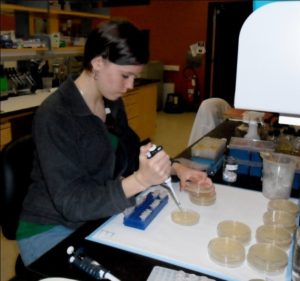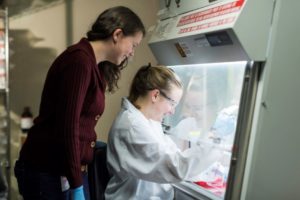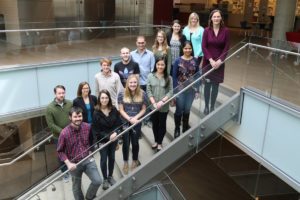Amani Gillette’s Story

Amani Gillette, a junior from LaFollette High School in Madison, started the Biotechnology Youth Apprenticeship Program (YAP) in Fall Semester, 2010. An outstanding youth apprentice (YA) throughout her two years in the program, she excelled in both the specialized laboratory course at the BTC Institute and in her work site research under the mentorship of Professor Margaret McFall-Ngai, UW-Madison Department of Medical Microbiology & Immunology. Amani’s characterization of a gene and protein found in a small tropical squid resulted in her first scientific publication and poster presentation.
Fast forward— after receiving a B.S. in Biomedical Engineering at Michigan Technological University (which included working in a tissue engineering lab and two summers interning at Promega Corporation under the supervision of Dr. Dan Lazar to help develop an assay for autophagy), Amani is now back in Madison. She is in her second year of graduate school and, working with Dr. Melissa Skala at the Morgridge Institute for Research, is currently mentoring Biotechnology YA Ava VanDommelen (senior from DeForest High School). Following in Amani’s footsteps, Ava will present her research nationally this January at the SPIE conference (the International Society of Optics and Photonics).
Recently Amani wrote about her YAP-Biotechnology experience:
In high school I was introduced to, and became a part of, a biotechnology program that initially introduced me to lab work initially through an intensive four hour weekly class while also preparing me to interview and get hired by a research lab in the area. This program was my first real exposure to research, in its many exciting and frustrating forms, and was instrumental in helping me decide what to do with my future. During my time in this first lab I realized that research was something I could see myself doing for a long time; the thrill of discovery, the detailed problem solving, and the reward of finally getting that stubborn Western Blot to work appealed to me, and still does.The lab that hired me as a part of the youth apprenticeship program was a microbial sciences lab with research focused on the symbiosis between the bacteria Vibrio fischerii and the small tropical squid Euprymna scolopes. I was given the lead on a gene sequencing project and with the help of my mentor, started by performing the technique known as 5’ RACE to generate the full length sequence. From there I learned the methods for analyzing the sequence through computer programs that define the structure of the protein and its relatedness to other proteins. In addition, I identified a unique sequence in the protein, to which we were able to have an antibody made in order to localize the encoded protein within the squid tissue.

Amani’s experience with YAP gave her a head start in her scientific training and career. It also motivated her to provide similar experiences for others:
When I was accepted into UW-Madison and Dr. Skala’s lab it felt like I had come full circle, not in a research sense, but in the sense that I was in a position where I could give back to the program that jump-started my interest in research many years ago. One of the first things I did in Dr. Skala’s lab was tell her about the local YA program and to my relief she was as excited as I was to become involved with it. I have taken great pride in mentoring our first YA and am thrilled that others in my lab have seen the benefit and will be continuing to support this program. Under my guidance Ava has been trained in our lab’s techniques and has started her own research project and will even be presenting a poster at a national conference, all before graduating high school. It is great to help someone learn new skills, and develop their own ideas for how experiments should progress. In an effort to improve my mentorship skills I am in week 5 of an 8-week Research Mentor Training program that is an online seminar series developed by the Wisconsin Program for Scientific Teaching and the Delta Program at UW.
Q/A with Ava VanDommelen, Current YAP Student
What have you learned/gained from the YAP-Biotech program?
The Youth Apprenticeship-Biotechnology program has impacted my life in such a tremendous way by giving me hands-on experience and exposure in academic research before even graduating high school. Although science is something that has always fascinated me, this program allowed me to further explore something I love and solidified my decision to pursue a career in the field.
What is the topic of your scientific poster? What is your research project?
This past summer I began a research project in collaboration with Dr Manish Patankar at the UW Hospital looking at the metabolism of immune cells using fluorescence lifetime imaging microscopy. The scientific poster I will be presenting at SPIE will be about the impacts that the acidic tumor microenvironment has on the metabolism, mobility and viability of various immune cells.
What are your plans for next year?
Next year I am planning on attending a four-year university to major in Biology/Biochemistry. I hope to continue participating in research throughout my college career as well.
What are your feelings about having a science mentor? How has Amani helped you learn and grow?
I have really enjoyed having a mentor through the Youth-Apprenticeship-Biotechnology program. I actually was able to meet Amani before I applied to the program and after she told me about it, I knew it was something I wanted to be a part of. Amani has been a very influential person in my life as she has taught me so much; whether it be about how to correctly write a scientific abstract, to operating the microscope or giving me advice on applying to colleges, I am so incredibly thankful that I was able to have Amani as my mentor as she has helped to me to grow my love for science and grow as a person.
What are some challenges you’ve had to address as part of the YAP-Biotech program?
Balancing academic requirements and being involved in athletics throughout my high school career as well as being a part of the Youth-Apprenticeship Biotechnology program was definitely a challenge for me. Being a part of so many activities created a chaotic schedule, but it taught me how to balance my time more wisely and I would not trade my experiences for the world.
Q/A with Dr. Melissa Skala at the Morgridge Institute for Research
 What do you see as strengths of the YAP-Biotech program? How has it positively impacted your lab?
What do you see as strengths of the YAP-Biotech program? How has it positively impacted your lab?
YAP-Biotech students come to the lab prepared to make progress. They are well trained, so we spend our time asking research questions, rather than teaching basic lab skills. This makes them valuable members of the lab.
What would you tell another professor or employer about the program?
The program selects for the most motivated students and professionally trains them, so the result is talented young scientists who are ready to take on a challenge. I wouldn’t hesitate to take any of these students full time, they are a catch.
What makes this program unique in terms of high school science campus research experiences?
The program is an immersive research experience, which is a refreshing contrast to traditional textbook science in high school. Students quickly learn that very little is known about basic biology, that assumptions aren’t always valid, and that rigorous science is the best way to create new knowledge. These lessons can’t be taught in a classroom, and are critical to success in biomedical careers.
Why are you hiring another YA this year?
The students bring energy and drive to the lab, and it’s great for the lab atmosphere. The students are also capable of exploring new areas of interest, which is exciting for me and the rest of the lab. It’s also fun to watch the students mature and gain independence over their research experience.
Any other thoughts you’d like to share about the program or your YA Ava, and your graduate student Amani?
Amani is a fantastic graduate student, largely because of her significant research experiences starting with the YA program. She has also been a wonderful mentor to Ava, which has helped Ava mature into an independent scientist. Both Ava and Amani are wonderful lab members, and fun for everyone to work with. These experiences are what make biomedical research rewarding and stimulating.
Learn More
This story is just one example of the impact of the Wisconsin Department of Workforce Development’s Biotechnology Youth Apprenticeship Program. Training young scientists for over twenty years, this unique program, with its combination of specialized training and extensive worksite experience, nurtures the STEM workforce. For more information please see: www.dcsc.org or www.btci.org
Latest posts by Barbara Bielec (see all)
- Conferences Are Important for High School Students—Youth Apprentices and STEM Professional Development - December 3, 2018
- Playing it Forward: Biotechnology Youth Apprenticeship and Mentorship - November 1, 2017
- A Successful Launch for Biotechnology: The Basics for Middle School Teachers - July 5, 2017

One thoughtful comment